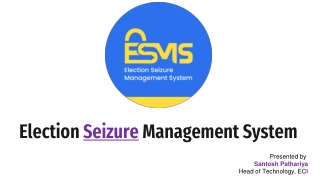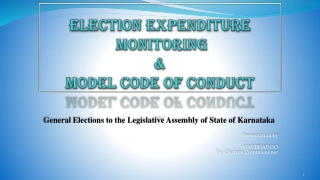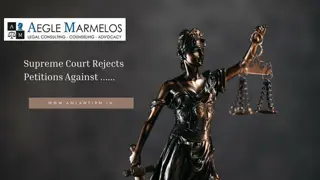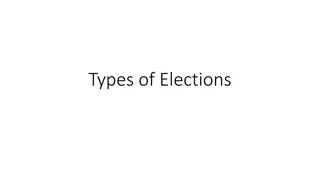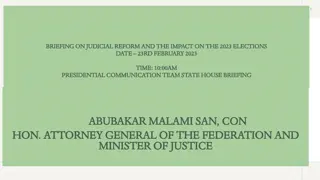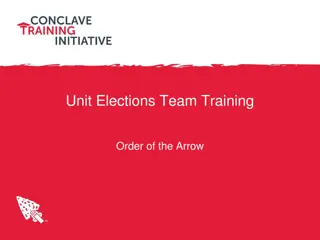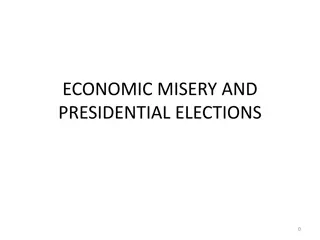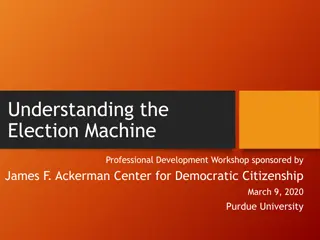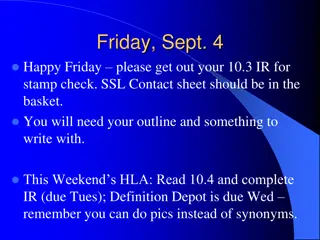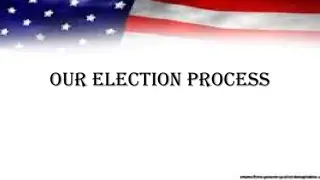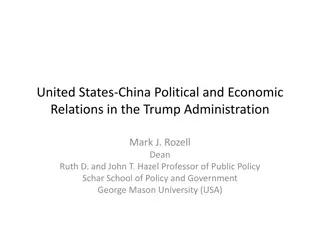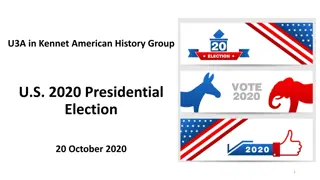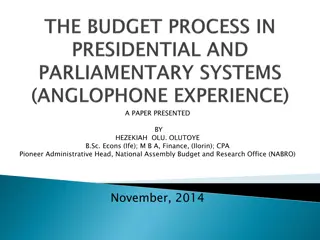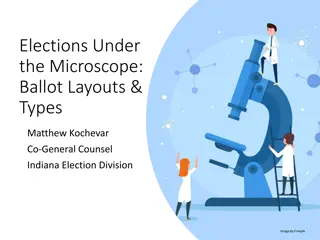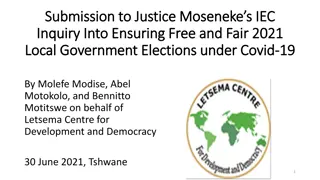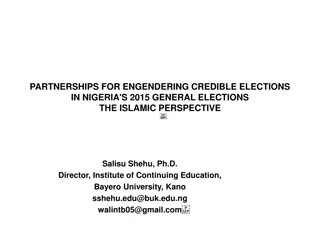
Analysis of Ghana's 2024 Presidential Elections & Projections
Explore the analysis of Ghana's past presidential elections, regional voting patterns, and potential outcomes for the 2024 election. Investigate key factors such as candidate performances, swing regions, government programs, and more. Insights provided by Francis Kobena Tandoh shed light on potential winners and the impact of various political dynamics on the election landscape.
Download Presentation

Please find below an Image/Link to download the presentation.
The content on the website is provided AS IS for your information and personal use only. It may not be sold, licensed, or shared on other websites without obtaining consent from the author. If you encounter any issues during the download, it is possible that the publisher has removed the file from their server.
You are allowed to download the files provided on this website for personal or commercial use, subject to the condition that they are used lawfully. All files are the property of their respective owners.
The content on the website is provided AS IS for your information and personal use only. It may not be sold, licensed, or shared on other websites without obtaining consent from the author.
E N D
Presentation Transcript
GHANAS PRESIDENTIAL ELECTIONS Analysis & 2024 Projection By: Francis Kobena Tandoh 0248381948/0206397224
OUTLINE (1): Introduction Performance of presidential candidates in the Fourth Republic Regional voting patterns and who wins which region(s) in Election 2024 Swing regions and where they are likely to vote in 2024 Creation of new regions and impact on Election 2024 Government programmes and repercussions on Election 2024 President Akufo-Addo s exit, good or bad for NPP?
OUTLINE (2): Mahamudu Bawumia s introduction and what does it mean for the NPP The 4th coming of John Dramani Mahama NDC & NPP Propaganda Machinery and impact on Election 2024 Scandals/allegations of corruption against the Akufo- Addo/Bawumia government Impact of Alan Kyeremanten s breakaway from the NPP on Election 2024 Impact of global elections on Ghana/Contagion Theory Conclusions/projection for Election 2024
1.0: INTRODUCTION(1) Ghana has held eight (8) successive presidential and parliamentary elections upon return to multi-party democracy between 1992 and 2020. This has resulted in peaceful alternation of power between two major political parties; the New Patriotic Party (NPP) and the National Democratic Congress (NDC) achieving what Samuel Huntington refers to as the two-turnover test. Whiles this remains a major step in consolidating multiparty democracy and a model for Africa, Boafo-Arthur has argued that, Elections in most African countries remain very difficult to predict due to several social factors like high levels of illiteracy, ethnic proclivities, religious attachment and personalities (Boafo-Arthur, 2006:1).
1.0: INTRODUCTION (2) The country will conduct its ninth general election under the Fourth Republic dispensation on December 7, 2024. This write-up attempts an analysis of the voting pattern of Ghana since 1992 and make a projection as to which political party or candidate is likely to be entrusted with political power in the country s 2024 general election. To achieve this, I have selected secondary sources from the Electoral Commission official website, academic books, reports, and journals for the exercise. My key finding is that the governing New Patriotic Party (NPP) will retain power in the 2024 general election.
TABLE 1: PERFORMANCE OF NDC AND NPP PRESIDENTIAL CANDIDATES IN PRESIDENTIAL ELECTIONS IN GHANA (1992-2020) Candidate/ Year 1992 Jerry Rawlings 58.4 Albert Adu Boahen 30.3 John A. Kufuor John E. A. Mills Nana A. D. Akufo-Addo John D. Mahama 1996 57.4 39.7 2000 (Rd. 2) 56.9 43.1 2004 52.4 44.6 2008 (Rd. 2) 50.2 49.8 2012 47.7 50.7 2016 53.7 44.5 2020 51.2 47.2
Table 1 highlights results of various candidates in presidential elections since 1992. It can be established that all incumbents that sought re- election had their votes reduced in their next elections. Jerry Rawlings, who polled 58.4% in 1992 obtained 57.4% in his re-election bid, a reduction of - 1%. J. A. Kufuor obtained 52.4% in his re-election after he polled 56.9% in the second round of election 2000. This means Kufuor had a reduction of -4.26 in the election that retained him as president. After polling 50.70% to be elected president in the 2012 general election, John Mahama polled 44.53% in the 2016 election, a -6.17% reduction in votes. This happened to be unprecedented in the history of Ghana s Fourth Republic. In the 2020 election, however, John Mahama polled 47.2%, gaining 2.7% percent.
Nana Addo Dankwa Akufo-Addo after two unsuccessful attempts at the presidency in 2008 and 2012 was third time lucky and got elected president in 2016 polling 53.73% of total valid votes, retained in the 2020 election with 51.2% votes, a drop in -2.52%. Unlike elections 2008 to 2020 where the NPP had consistently presented Akufo-Addo as its candidate, the governing party is now presenting a new candidate, in the person of Dr. Mahamudu Bawumia, the vice president under Akufo-Addo s two tenure in office since January 2017. Bawumia, who is seen as a blend of a technocrat and modern-day politician will be coming face-to-face with John Mahama, the former president of the Republic. Ghanaians have had the opportunity of witnessing both candidates as Vice Presidents and that will play a huge role in determining which of the two can be trusted by the electorates.
TABLE 2: PERFORMANCE OF NPP IN THE REGIONS BETWEEN 1992 AND 2020 1992 1996 2000 2004 Year/ Region Ahafo Ashanti Bono Bono East Central Eastern Gt. Accra North East Northern Oti Savannah Upper East Upper West Volta Western W. North 2008 2012 2016 2020 55.1 71.6 58.2 44.3 52.7 60.5 48.1 51.4 46.1 35.7 35.2 34.4 29.9 14.1 51.0 45.0 60.5 29 65.8 61.7 75.1 50.6 74.6 51.9 72.4 50.6 70.9 47.3 76.3 53.9 26 37.7 37 43.3 45 43.3 49.7 55 52.5 58.8 60.3 51.9 46 57.1 46 45.5 56.9 46.9 53.2 62.4 52.4 16.3 33 37.8 36.2 38.3 39.1 41.5 10.5 8.9 3.6 22.8 11.2 17.4 4.7 40.9 21.5 15.5 8.5 50.5 31.7 32.2 14.6 56.6 35.3 38 14.9 47.6 29.3 29.3 12.9 43.8 29.3 35.9 17.4 51.8
TABLE 3: PERFORMANCE OF NDC IN THE REGIONS BETWEEN 1992 AND 2020 1992 1996 2000 2004 Year/ Region Ahafo Ashanti Bono Bono East Central Eastern Gt. Accra North East Northern Oti Savannah U. East U. West Volta Western 2008 2012 2016 2020 44.2 26.1 40.6 54.7 45.9 38.5 51.0 47.0 52.9 62.8 63.0 63.3 67.4 84.4 46.2 32.9 61.9 32.8 36.0 21.6 44.6 24.1 46.1 26.1 47.7 28.4 51.5 23.0 44.9 66.5 57.3 53.4 55.2 53.8 54.0 43.7 41.3 42.7 39.2 38.4 46.4 50.6 41.1 52.1 52.1 42.0 52.3 44.9 36.6 46.7 63.0 61.2 57.4 56.9 56.8 58.2 56.0 54.0 51.0 93.2 61 74.6 69.0 94.5 57.3 49.3 62.3 86.2 43.9 53.9 56.7 83.8 40.9 56.1 54 82.9 47.1 66.4 66.5 88.5 54.4 60.3 58.4 81.0 45.9
REGIONAL ANALYSIS/PROJECTION Ahafo This is one of the new regions created by the NPP government in 2019 and the people voted for the ruling party in appreciation during the 2020 presidential election with a 55.1% vote. The same trend is expected to continue and the NPP is projected to win the region again in 2024.
Ashanti This is the stronghold of the governing NPP as it has won this region since 1992. The NPP won the 2000, 2004 and 2016 presidential elections with 74%+ votes. Despite winning the 2020 general election, the party suffered a dip in votes from 76.3% in 2016 to 71.6% in 2020 mainly due to apathy of their supporters. This explains the reason why the party approved Matthew Opoku Prempeh, a son of the region as running mate to Bawumia to focus on whipping up their support base. If the NPP is able to galvanize support of the region to pull 74%+ votes, it will win the presidential election in 2024. Conscious of the significance of this region, the NDC is also leaving no stone unturned in improving their performance. The party obtained 23% in 2016, 26% in 2020 and if it is able to obtain 30%, the presidential election is likely to go in their favour.
Bono The NPP has won five out of the seven general elections in this region. The governing party won by 53.9% and 58.2% in the 2016 and 2020 polls respectively and is likely to see a rise in its percentage votes. Bono East This is one of the new regions created by the NPP government in 2019 and the people voted for the NDC in the 2020 presidential election with a 54.7% vote. The ruling NDC is projected to win the region again in 2024.
Central This is one of the swing regions in the country. Both the NDC and NPP has won in the Central Region four times each; the NDC in 1992, 1996, 2008 and 2012 while the NPP won in 1996, 2000, 2016 and 2020. The Central region has been changing parties every eight years. What is interesting about this region is that the party that wins the region eventually wins the presidential election. It is therefore projected the NPP will win this region in 2024 with a slim margin. Eastern Apart from the first two general elections that the NDC won, the NPP has been winning this region since the year 2000 till date. Being the home region of outgoing President Nana Akufo-Addo, the NPP is expected to maintain or suffer a slight dip in the 60.5% votes that it obtained in the 2020 election. The NPP will still win the region as the NDC s percentage vote will not go beyond 42%.
Greater Accra The Greater Accra Region, which is one of the swing regions has similar characteristics like their other counterparts; the Central and Western Regions. The region has been voting 8 years for one of the two major parties and changed to vote for the other until the 2012 election. The eight-year cycle was however truncated after 2016. Despite winning Greater Accra with 52.4% in 2016, the NPP lost this region in 2020 polling 48.1%. The contest in 2024 will be quite tight between the two major parties however, the NDC is likely to pull through with a slim margin.
North East This is one of the new regions created by Akufo-Addo with one of their own, Mahamudu Bawumia as the Vice President. The people rewarded the NPP for giving them a region which has been on their minds for quite a long time. The NPP polled 51.4% in the 2020 presidential election. Having made nonsense of NDC propaganda against them that the NPP will never elect a northerner to lead them, the electorates there are projected to vote massively for the governing party because of the Bawumia factor and the socio-economic transformation in the area.
Northern This is one of the regions that the opposition NDC has been doing well since 1992. The NDC has won this region in every presidential election however, the fortunes of the party have been on a downward trajectory since 2012. On the hand, the NPP has been improving their votes with each passing election. The NPP polled 41.5% and 46.1% in the 2016 and 2020 presidential elections respectively, a 4.6% gain. With the Bawumia factor and the enormous work done in terms of infrastructure by the government, it is projected that the NPP will be closing the gap even though the NDC will still win the region.
Oti Carved out of the Volta region, this is one of the new regions created in 2019 by the Akufo-Addo led administration. The NDC has dominated this region and nothing drastic is going to change except that the ruling party will improve its 35.7% votes obtained in the 2020 general election. The NDC will win this region. Savannah Also, one of the new regions carved out from the Northern region in 2019. This is a predominantly opposition stronghold. The NPP managed a 35.2% of total valid votes in the last election in 2020. It is anticipated the NPP will improve its votes however, the NDC will still win the region.
Upper East The NDC has won in every single general election in this region since 1992. The region is likely to vote massively for the largest opposition party again. A development worth mentioning is that the NPP has been improving its performance polling some 34.4% in the 2020 general election. Upper West This is one of the traditional strongholds of the NDC and it will maintain its dominance in this region by winning in the 2024 polls since the NPP has never won it before.
Volta Described as the World Bank of the NDC, the region has since 1992 voted massively for the main opposition party. NDC will win close to 85% of total valid votes cast in this region. An emerging trend is that the NPP has been gaining grounds in this region and is likely to poll about 15% of total valid votes in the 2024 general election.
Western The NDC has won in this region on three occasions; 1992, 1996, 2008, and 2012 while the NPP won the 2000, 2004, 2016, and 2020 presidential elections in the Western Region. After the region voted for the NDC in the 1992 and 1996 elections, it went for the NPP in the 2000 and 2004 elections and again changed to vote for the NDC in the 2008 and 2012 elections. Western region changed and voted for the NPP in the 2016, and 2020 polls. Per the pattern, Western region is supposed to change this time to vote for the NDC but after a careful study of the figures, the contest is going to be quite tight but the NPP will be pulling through with few percentage votes.
Western North This is the last of the new regions created in 2019. The governing NPP polled 45% while the NDC obtained 53.6% in the 2020 general election. It is projected that the NDC will win the region in the 2024 election with ease.
1.4: SWING REGIONS AND WHERE THEY ARE LIKELY TO VOTE IN 2024 Ghanaian elections over the years has followed some pattern in determining which party captures political power. To this end, some regions have earned the enviable accolade of being referred to as the swing regions and have become a major force in determining election outcomes. The analysis of presidential elections results in Ghana from 1992 to 2020 indicates that out of the existing regions, four/five of them switch or change support for the NDC and the NPP at designated times. These regions include the Central, Greater Accra, Western, and Bono/Ahafo.
TABLE 4: VOTING PATTERNS IN THE SWING REGIONS BETWEEN 1992 AND 2020 1992 1996 2000 2004 Year/ Region 2008 2012 2016 2020 Central NDC NDC NPP NPP NDC NDC NPP NPP Gt. Accra NDC NDC NPP NPP NDC NDC NPP NDC Western NDC NDC NPP NPP NDC NDC NPP NPP Bono/Aha fo NDC NPP NPP NPP NDC NDC NPP NPP
Apart from the then Brong Ahafo Region that deviated in 1996, the elements of swing voting have evidently been portrayed in elections in Ghana especially from the 2000 to the 2016 general elections. In the 1992 and 1996 general election, Central, Greater Accra and the Western regions voted for the NDC and Jerry Rawlings won the presidency. The swing regions unanimously voted for the NPP in the 2000 and 2004 general elections and John Kufuor won the presidency for two terms. In the 2008 and 2012 general election, the Central, Greater Accra, Western and Bono/Ahafo regions all voted for the NDC ensuring John Atta Mills and John Mahama were elected presidents in those periods.
In the 2016 election, all the swing regions voted for the NPP contributing to Nana Akufo-Addo winning the presidency. However, in the 2020 general election, Greater Accra, deviated from the 8-year cycle voting pattern even though Central, Western, Bono/Ahafo regions voted for the NPP to retain the incumbent in government. The governing NPP is seeking to extend its eight years in office and from our findings, there will be a repetition of the 2020 pattern. The NPP is likely to win in the following regions; Bono/Ahafo, Central, and Western but will lose in the Greater Accra in the 2024 general election.
1.5: CREATION OF 6 NEW REGIONS AND IMPACT ON ELECTION 2024 The impact of the six newly created regions by the NPP government led by Akufo-Addo on election 2024 is quite interesting. From our findings, the governing NPP will win in two while the rest will be won by the opposition NDC. The NPP will win in Ahafo, and the North East regions while Bono East, Oti, Savannah, and Western North regions will be won by the NDC.
1.6: GOVERNMENT PROGRAMMES AND REPERCUSSIONS ON ELECTION 2024 The Akufo-Addo/Bawumia government has embarked upon several programmes and policies to improve the economy and ultimately raise the standard of living of the Ghanaian people. The free Senior High School policy, which was the flagship programme of the NPP ahead of the 2016 election and was implemented in September 2017 till date continues to be the highest selling point of the governing party. The impact of the policy has been quite huge and will play a determining factor in election 2024. It is therefore not surprising that both Bawumia and Mahama are all talking about continuing the policy.
While the Vice President talks about upgrading the policy, the former President is trumpeting reviewing the policy to make it better. The free SHS policy has undoubtedly transformed many lives and homes across the country and many are those who will make their decision based on it. Voters are now left to decide between Bawumia and Mahama who is trustworthy, and reliable to continue the legacy of outgoing president Nana Akufo-Addo.
Besides, the government has provided several education infrastructures across the country including kindergarten, primary, Junior High School and model JHSs with laboratories, SHSs, Science, Technology, Engineering and Mathematics (STEM) schools, upgrading and building infrastructure for schools at the tertiary level among others. Apart from the free SHS, the government has also embarked upon the expansion of road network of the country coupled with the construction of interchanges notable among which include the Pokuase, Tema, Tamale, Sofoline, Suame Magazine and the recently commissioned flower pot interchange among several other spread across the country.
The introduction of the District Road Improvement Programme (DRIP) by the government for all the districts spread across the country to use the equipment to reshape their deplorable roads in their areas while central government focussed on the highways and interchanges and major bridges will also inform people s choice in the election. The construction of 111 hospitals (Agenda 111), the introduction of the drone delivery technology in the health sector, introduction of digitalization in virtually every sector of the Ghanaian economy which has contributed significantly to improving lives will all be deciding factors in election 2024.
1.7: AKUFO-ADDOS EXIT, GOOD OR BAD FOR NPP? President Nana Akufo-Addo assumed office on January 7, 2017 and hit the ground running with his programmes and policies. He rolled out his flagship free SHS policy in September of that year and later started others such as the Planting for Food and Jobs (PFJ), the I District I Factory (1D1F), One Constituency One Million Dollars, One Constituency One Ambulance, the Ghana Card, prudent management of the economy in his first term and the able-manner with which he handled the COVID-19 pandemic which he received praise both in and outside the country. He enjoyed so much goodwill hence it was not surprising he was re- elected during the 2020 presidential election.
During his second-term however, the impact of COVID-19 pandemic, the Russian-Ukraine war and the debt restructuring programme embarked upon by the government has had negative impact on the Ghanaian economy hence resulted in increasing cost of living among the people. Several Ghanaians, including pensioners who were affected as a result of the debt restructuring has given the government a bad name and most of them are waiting for the election to punish the ruling party. Despite the challenges that confronted the Akufo-Addo/Bawumia government in the second term, our findings indicate that the management of the economy will also be a factor that will inform the choice of voters in the election.
Generally, the NPP seems to enjoy some goodwill from the public than the NDC whom people were expecting to see superior economic policies to take them out of the current hardship but surprisingly failed to live up to expectation. Akufo-Addo s free SHS policy, which won the elections for the NPP, as well as the National Health Insurance Scheme (NHIS), free maternal policy, school feeding programme, metro mass transport introduced by John Kufuor will continue to play a significant role in the fortunes of the governing party at the 2024 polls.
1.8: MAHAMUDU BAWUMIAS INTRODUCTION AND WHAT IT MEANS FOR THE NPP One person who has risen so fast to emerge in the country s political scene is Dr. Mahamudu Bawumia, the man seeking to take over from his boss, Nana Akufo- Addo. A technocrat and unknown Bawumia who was introduced in 2008 has become a matured politician. The former Deputy Governor of the Bank of Ghana is said to be behind 33 major policies that the NPP government has introduced within the last eight years.
Being a Muslim, Bawumia is seen by many as humble, unifier and visionary who appeals to the clergy, traditional rulers, the youth, women, and the three main religions; Christians, Muslims, Traditional worshippers in the country. He is seen as a fine politician whose campaigns are devoid of insults and able to convey his bold solutions to the problems of the country for voters to decide on. Despite being the sitting Vice President, Bawumia has campaigned as if his party was in opposition and seeks to build upon the legacy of Akufo-Addo with his upgrade Ghana agenda.
1.9: THE 4TH COMING OF JOHN DRAMANI MAHAMA John Mahama had his first shot of the presidency in December 2012 when he attempted it for the first time after the demise of John Atta Mills on July, 24, 2012 while in office. Mahama managed to beat the challenge from Nana Akufo-Addo to become the fourth president to be elected in the country s Fourth Republic. However, during his re-election bid in 2016, Akufo-Addo beat him in that election with a difference of almost one million votes to be elected president. Akufo-Addo was given a second term during the 2020 general election beating Mahama with about 500,000 votes difference.
Having stayed in opposition for eight years, Mahama is staging a comeback with his resetting Ghana agenda and says he will steer Ghana to operate a 24-hour economy if given the nod by the electorates to become the next president from January 7, 2025. A cross-section of the Ghanaian populace considers his flagship policy and others transformative, but some also say Mahama is a known quantity who has had the opportunity he is seeking before but messed up. Some have argued that the NDC could have easily won election 2024 with a different presidential candidate other than John Mahama. It must be emphasized that the NDC has not succeeded in removing the incompetent and corruption tag put on Mahama prior to the 2016 general election. This negative tag is still fresh in the minds of a cross-section of voters and will not forgive the former president.
2.0: NPP & NDC PROPAGANDA MACHINERY AND IMPACT ON ELECTION 2024 The two major parties in their attempt to either retain or recapture political power has put their propaganda machinery fully in motion throwing jabs at one another all in an attempt to paint their opponent black before the voting public. Despite expressing his willingness to review to continue the free SHS policy, the governing NPP has been doing everything possible to convince voters that John Mahama will cancel the policy if given the nod and that he should be rejected. This seems to be working for the NPP as Mahama and other members of his campaign team have had the odious task of correcting that misrepresentation of their position on the free SHS programme.
The NPP has also tried hard to make nonsense of the 24-hour economy policy of the NDC explaining how hollow that policy is out of which they have branded Mahama as still incompetent for being unable to come out with a forward-looking policy after staying in opposition for eight years. The NDC on the other hand has attacked the economic prowess of Bawumia trumpeting hard the deteriorating cedi against major trading currencies leading to increasing cost of living and hardship being experienced by many Ghanaians. A cross-section of the public identifies with the opposition party on this issue. Several attempts have also been made by the NDC to present Bawumia as a liar to the public for certain utterances he made about the economy in times past when the NPP was in opposition and in government. However, our findings indicate Bawumia is seen as more credible than the other candidates contesting the election.
2.1: SCANDALS/ALLEGATIONS OF CORRUPTION AGAINST THE AKUFO- ADDO/BAWUMIA GOVERNMENT The opposition NDC has levelled several allegations and scandals on the government including the cash for seat, the building of the national cathedral, sale of SSNIT hotels, the alleged diversion of COVID-19 funds, the excessive borrowing by the government with nothing to show among others. In as much as the NDC, led by Member of Parliament for North Tongu, Samuel Okudzeto Ablakwa have tried to unearth certain scandals/corrupt practices by the government, the party has not been able to raise any acts of corruption against Bawumia hence free from corruption tag or any wrongdoing in government. Quite a number of the Ghanaian public see Bawumia as a clean person when it comes to acts of corruption.
2.2: IMPACT OF ALAN KYEREMANTENS BREAKAWAY FROM THE NPP ON ELECTION 2024 Former leading member of the NPP and Cabinet Minister in the Kufuor and Akufo-Addo governments, Alan Kyerematen s decision to breakaway from the party after losing out in the party s presidential primaries was seen as a big blow to the governing party. Until recently, Kyerematen s exit would have hurt the NPP but for the attack on President John Kufuor by himself after some two NDC communicators hurled insults on the former president over his decision to endorse Bawumia as his preferred candidate going into the presidential election had given the former minister a bad image. There are some of his followers who are angry hence left his Movement for Change to return to their mother party, the NPP. This, in a way will help the governing party as majority of the people have seen that Keyeremanten is too bitter and has set out an agenda to destroy the NPP. This has won back some supporters for the NPP few days to the general election.
2.3: IMPACT OF GLOBAL ELECTIONS ON GHANA/CONTAGION THEORY Elections across the globe has influence in one way or the other on elections in other countries. There has been a long line of losses for incumbent parties in 2024. The issues driving voter discontent have varied widely, though there has been almost universal malaise since the COVID-19 pandemic as people and businesses struggle to get back on their feet while facing increasing high prices, cash-strapped governments and a surge in migration. There seem to be an overall sense of frustration among electorates towards the political class, viewing them as being out of touch with their predicament. There is a general feeling among voters, according to our research, that there is a surge in economic distress and a sense that no political faction truly represents them.
Since the pandemic hit in 2020, quite a significant number of incumbents across the globe have lost power. Donald Trump s Elephant Party, the Republicans victory over Kamala Harris Democratic Party in the U. S. presidential election is the latest in the long line of losses for incumbent parties in 2024. In Britain, the right-of-centre Conservatives suffered their worst result since 1832 in July s election, which returned the centre-left Labour Party to power after 14 years. In Asia, a group of South Korean liberal opposition parties, led by the Democratic Party, defeated the ruling Conservative People s Party in April s parliamentary elections. In Botswana, the electorates voted out the incumbent party that has ruled the country for 58 years since independence in October 2024.
In Rwanda, however, long-serving President Paul Kagame won with an emphatic 99% of total valid vote cast in the country s election. The Africa National Congress (ANC) in South Africa was also retained in power in May though the party lost its parliamentary majority. In June, India s Narendra Modi won a third term in office though his Hindu nationalist Bharatiya Janata Party lost its majority in the legislative body while Claudia Sheinbaum, who succeeded Andres Manuel Lopez Obrador, who was limited to a single term, easily won the presidential election in Mexico in June 2024. Also, Japanese Prime Minister, Shigeru Ishiba was retained in office however, the Liberal Democratic Party (LDP) which had governed the country since 1955 with a one-sided rule has ended with a loss of parliament. How will these elections impact on the Ghanaian one?
PROJECTION FOR ELECTION 2024 Proj. 70% Voter turnout Votes (%) 251,499 56 2,306,692 73 503,941 59 470,981 43 1,251,114 51 1,267,295 61 2,635,712 47 237,918 55 846,954 48 287,425 36 239,702 37 518,902 35 362,856 30 716,681 15 902,144 50.5 Region Total Voter Popn. 359,284 3, 295, 274 719,274 672,830 1,787,305 1,810,421 3,765,303 339,883 1,209,934 410,607 342,431 741,288 518,365 1,023,830 1,288,777 Proj. NPP Total Valid Votes 140,839 1,683,885 297,325 202,522 638,068 773,050 1,238,785 130,855 406,538 103,473 88,690 181,616 108,857 107,502 455,583 Proj. NDC Votes (%) 44 27 41 57 48 39 52 45 52 64 63 65 69 85 47 Total Valid Votes 110,660 622,807 206,616 268,459 600,535 494,245 1,370,575 107,063 440,416 183,952 151,012 337,286 250,371 609,179 424,008 Ahafo Ashanti Bono Bono East Central Eastern Gt. Accra North East Northern Oti Savannah Upper East Upper West Volta Western
CONCLUSION The table displays the voter population in the 16 regions of the country and projections made by this researcher based on extrapolation. The NDC won in the following nine (9) regions: Bono East, Greater Accra, Northern, Oti, Savannah, Upper East, Upper West, Volta, and Western North with 3,808,757 total valid votes. The NPP won in the following seven (7) regions: Ahafo, Ashanti, Bono, Central, Eastern, North East and Western with 4,119,605 total valid votes. The NPP s 7 regions that it won beat the NDC s 9 regions won with a difference of 310,848 total valid votes.
It is evident from the table that from a projected 70% voter turnout, the NPP is likely to poll some 6,718,520 total valid votes, representing 51.0% while the NDC is expected to garner 6,374,691 total valid votes representing 48.4%. The NPP will poll 343,829 more votes than the NDC. Based on this research, it is my prediction that the NPP is more likely to retain power in the 2024 presidential election.
By: Francis Kobena Tandoh Lead Political Analyst/Journalist frankonash81@gmail.com 0248381948/0206397224 Thank you.

